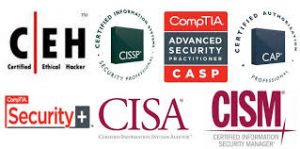The dramatic rise in cyber attacks over the past few years has caught most businesses off guard. Their cyber security departments are severely understaffed, causing them to look desperately for qualified professionals to help tackle the threat.
There has never been a better time to get into cyber security, so if you’re looking to enter the field, or further your career in it, you could benefit massively from gaining a relevant qualification. Here are four reasons why:
-
Cyber security professionals are well paid
Money isn’t everything when it comes to choosing your career, but it’s obviously a big factor for many people. We mentioned recently that people with a CISM®, PCIor GDPR qualification could earn £60,000 or more a year.
Of these, the CISM (Certified Information Security Manager) qualification is the most versatile. It’s the globally accepted standard of achievement among information security, information systems audit and IT governance professionals.
According to ITJobsWatch, people with a CISM qualification earn £64,000 a year on average. This figure has grown by more than 9% in the past two years.
-
There’s a high level of job security
The shortage of qualified cyber security professionals means that those in the field are less likely to be replaced or made redundant. Their skills are hard to find elsewhere, and the more someone gets to know the company, the more valuable they will become.
Additionally, because almost every organisation currently needs cyber security professionals, those with the relevant qualifications are more likely to find a position in a location or company that suits them.
-
There’s room for career growth
For the same reason that cyber security is a safe career, it’s also one that offers plenty of room for growth. Qualifications plus experience is a powerful combination that can help you move into more senior positions.
As you gain experience, you’ll also get the opportunity to earn more advanced qualifications. For example, you must have at least three years’ experience in IT governance to be eligible for a Certified in Risk and Information Systems Control (CRISC™) qualification, and five years’ experience to be eligible for a Certified in the Governance of Enterprise IT (CGEIT®) qualification.
-
The work is rewarding
Cyber security is still a relatively young field, making it an exciting and prosperous place. The threats that organisations face are constantly evolving, so you’ll always have new challenges. Plus, you know that your hard work is for a good cause: to stop cyber criminals and keep your organisation safe.
What qualifications do I need?
The qualifications you need will depend on the career path you choose. If you’re interested in governance, risk management, and compliance, for instance, a CGEIT qualification is essential. If you’re interested in information security, you’ll need a CRISC qualification.
We’re currently running promotions on our CRISC, CGEIT
, CISA
and CISM
training courses. If you book before 22 December, you’ll receive a 10% discount on the courses and a 5% discount on all reading materials.
Find out more about our:





